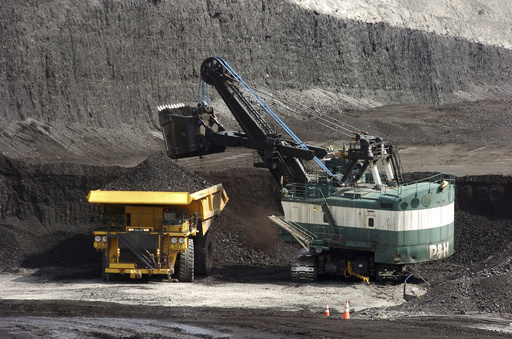BILLINGS, Mont. (AP) — A U.S. appeals court on Wednesday struck down a moratorium on coal leasing from federal lands in a move that could open the door to future coal sales from vast, publicly owned reserves of the fuel that’s a major source of climate-changing greenhouse gases.
The ruling from a three-judge panel of the 9th U.S. Circuit Court of Appeals is a setback for environmentalists and Democratic officials who worked for years to curtail the federal coal leasing program.
Yet it’s uncertain how much demand there will be from the mining industry for new leases: Coal production from federal lands dropped sharply over the past decade after many electric utilities switched to less polluting sources of power generation such as natural gas and renewables.
More than 260 million tons of coal, or almost half of the nation’s total, was mined by private companies from leases on federal land in 2022, the most recent figures available. That compares to more than 400 million tons of coal mined from federal lands in 2014.
Most of the mining occurs in Western states including Wyoming, Montana and Colorado.
The leasing moratorium — originally enacted in 2016 under former President Barack Obama — didn’t halt mining. Rather, it prohibited federal lease sales that are often crucial for companies seeking to expand their operations.
The moratorium was rescinded under the administration of former President Donald Trump, then revived by a federal district judge in Montana, who in 2022 ordered government officials to conduct a new environmental review before they could hold coal sales on federal lands. The order came in lawsuits filed by environmental groups; Democratic officials in California, New York, New Mexico and Washington state; and the Northern Cheyenne Tribe, which has fought for decades against coal mining near its southeastern Montana reservation.
But Wednesday’s appeals court ruling said the matter was moot when the 2022 order was issued, because Interior Department officials under President Joe Biden already had revoked Trump’s effort to end the moratorium. The panel of judges noted that a “de facto moratorium” appears to be in place now, since lease sales have diminished.
The ranking Republican on the Senate Committee on Energy and Natural Resources, Wyoming Sen. John Barrasso, said the Biden administration should move leases forward “instead of looking for new excuses.”
“Today’s court decision ending the Obama administration’s nationwide ban on coal leasing is good news for Wyoming and all Americans,” he said.
The National Mining Association said the ruling could allow stalled mining projects to advance. Among them is the proposed expansion of southwestern Wyoming’s Black Butte coal mine, which has been approved by state officials and is awaiting federal approval, according to the industry group.
A Northern Cheyenne official and environmentalists called for the Biden administration to respond with immediate steps to end new leasing, and to address coal’s ongoing harms to the climate and public health.
“We need the Biden administration to step up and live up to its promises to protect our climate, conduct a long overdue review of the federal coal leasing program, and make thoughtful plans for the future of public lands,” said Northern Cheyenne Tribal Administrator William Walksalong.
The federal coal program is run by the Interior Department’s Bureau of Land Management. Bureau spokesperson Brian Hires said the agency had no immediate comment on Wednesday’s ruling. Federal officials last year started an environmental review as required by the 2022 court order but bureau records indicate that work remains unfinished.
Coal combustion for electricity remains one of the top sources of U.S. greenhouse gas emissions, even after many coal-fired power plants shut down over the past decade because of concerns over pollution and changing economic conditions. Electric power generation accounts for about one quarter of total U.S. greenhouse gas emissions and most of that comes from burning coal, according to the Environmental Protection Agency.
Royalties and other payments from companies for coal mined on federal lands brought in more than $500 million last year, according to government data. The industry supports thousands of jobs and has been fiercely defended by Republicans in Congress and officials in coal-producing states. ___
Follow Brown: @MatthewBrownAP


